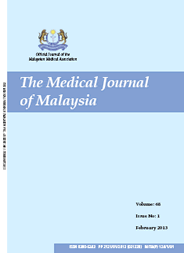MJM, Vol 70 Supplement 1 September 2015
Prevalence of poor sleep quality and its correlates
among secondary school teachers in Selangor Malaysia: a cross-sectional study
*Department of Social and Preventive Medicine, Faculty of Medicine, University of Malaya, Kuala Lumpur, **Julius Centre University of Malaya, Faculty of Medicine, University of Malaya, Kuala Lumpur
ABSTRACT
Background: Sleep is an important physiological process and becoming a world-wide health concern. Teachers are among the highest profession that often report poor sleep quality due to high workload and increasing students’ academic demands. The purpose of this study was to estimate the prevalence and identified correlated factors of poor sleep quality among secondary school teachers in Selangor, Malaysia.
Method: A cross-sectional survey was conducted in ten education district in Selangor, Malaysia. Multistage random-sampling procedures were used to enrol 1871 secondary school teachers. A self-administered structured questionnaire including the Pittsburgh Sleep Quality Index (PSQI) to measure sleep quality, the Depression Anxiety Stress Scale-21 (DASS 21) to screen for mental health, International Physical Activity Questionnaires (I-PAQ) to obtain data on health-related physical activity, teaching characteristics, physical health and other relevant characteristics to sleep were collected. Multiple logistic regression model were used to examine the association predictors with poor sleep quality.
Results: The mean PSQI global score was 5.45 (95% CI: 3.80-7.09). The prevalence of poor sleep quality (total PSQI score ≥ 5) was 61% (1134). In the univariate analysis, total (hours) of teaching with extra class a day (odds ratio (OR) 1.063; 95% CI: 1.019, 1.110), depression (OR 1.090; 95% CI: 1.035, 1.148), anxiety (OR 1.090; 95% CI: 1.075, 1.106) and stress (OR 1.080; 95% CI: 1.063, 1.097) had higher odds for poor sleep quality. Multivariate analysis showed that stress was statistically significant predictors of poor sleep quality among the participants.
Conclusions: Our study demonstrates that poor sleep quality is very common among secondary school teachers. It is significantly associated with stress. Little attention has been given to the sleep concerns of school teachers, and there is a need for further higher level of research. Comprehensive counter measures against poor sleep quality is strongly recommended.
Keywords: Pittsburgh Sleep Quality Index, depression, Anxiety, Stress, Teachers, Malaysia
